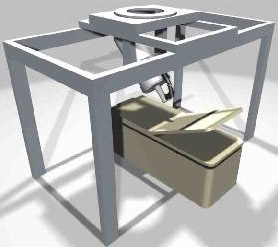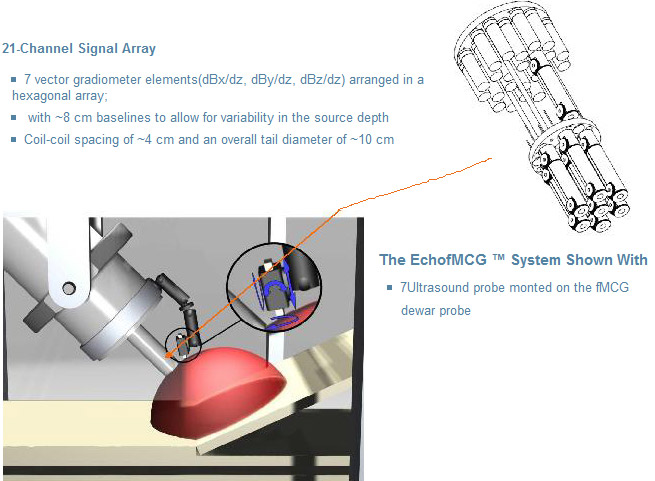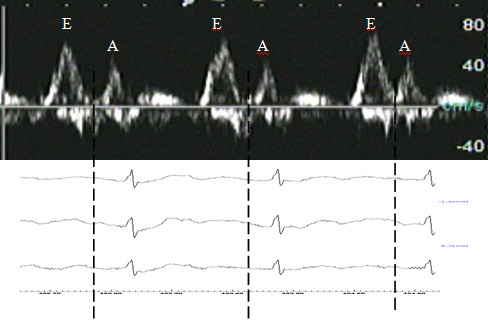Tristan Technologies, Inc. Echo-fMCG™ SQUID system for fetal Cardiac Measurements
The Echo-fMCG™ is a unique multi-channel vector fetal magnetocardiography (fMCG) system integrated with an echocardiography system, capable of simultaneously performing fMCG and echo/Doppler recordings. Such linking of echo/Doppler and fMCG allows the clinician to analyze the fetus rapidly for both hemodynamic as well as electrophysiologic abnormalities, such as fetal arrhythmias. This is the world’s first clinical modality to provide full characterization of the intrauterine condition of fetuses with life threatening heart conditions.
- Simultaneously detection of both ultrasound and magnetic fields associated with fetal cardiac electrical activity
- Vector gradiometer design to maximize captured fMCG information
- Small probe profile for easy positioning in close proximity to fetus
- Gantry movement offers four degrees of freedom for patient accommodation
Tristan’s Model 624 Echo-fMCG™ vector SQUID Dewar and Probe
System Configuration

- 7-element vector sensor array
- 1st order gradiometers with 8-cm baseline
- Gantry with (x,y,z) and tilt motion
- 10 mm offset from room temperature outer dewar surface
Echo-fMCG™

- Gradiometers with long baselines for extra detection depth
- Special technique to isolate SQUID from Ultrasound
- Reference channels to reduce ambient noise
- Small gap to allow closer distance from sensor to source
Echo-fMCG™ Features
Uses proprietary technology to bring the sensor coils very close to the subject to increase the signal/noise performance. Tristan is unique in its capacity to build thin “windows” between (cryogenic) sensor and (room temperature) source. The small gap technology has also been used to measure cortical sources in experimental animals such as rat, rabbit, pig, turtle, or monkey.

Simultaneous MCG and Echo/Doppler Recording
Simultaneous MCG and Echo/Doppler recording. Note the subtle change in E-A interval in the Doppler recording (top) in association with a change in P wave axis (middle MCG)
Echo-fMCG™ System Components
Sensor Unit and Dewar
- Optional: Coil-in-vacuum design
Gantry
SQUID Electronics
Data Acquisition Hardware
Data Acquisition and Analysis Software
EchofMCG™ System Advantages
- Vector field mapping capability
- Ability for deep source detection
- Synchronized fMCG and fetal ultrasound measurement
- Advanced data processing based on spatial filtering and ICA
About Tristan Technologies
Tristan Technologies, Inc. is a commercial supplier of SQUID-based biomagnetic and laboratory instrumentation. Tristan Technologies designs and manufactures a wide range of SQUID-based laboratory, biomagnetic, geophysical and non-destructive evaluation (NDE) instrumentation. Tristan specializes in the rapid prototyping of complex sensing devices and data processing systems. Nearly half of Tristan’s staff have advanced technical degrees, with a century’s accumulated experience in cryogenics and superconducting technology. Tristan presently occupies a nearly 2000 square foot facility in the Miramar area of San Diego. This location, near UCSD, provides easy access to unique manufacturing techniques and engineering expertise.
Tristan has made SQUID-based Biomedical systems to measure:
- Neonatal Magnetoencephalography (MEG)
- Animal MEG
- Fetal Heart Rhythm
- Spinal cord (12 and 71-channel systems, high speed)
- Liver Iron Concentration
- Intestinal Ischemia
- Single muscle fiber
- Monitor metal/magnetic particle mobility or dispersion
SQUID = Superconducting Quantum Interference Device.


